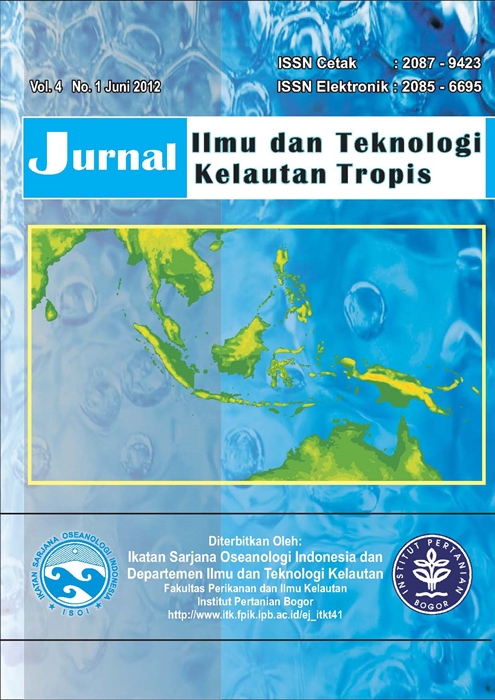INFLUENCES OF UPWELLING DURATION AND INTENSITY BASED ON SEA SURFACE TEMPERATURE ANOMALY TOWARD PRIMARY PRODUCTIVITY VARIABILITY IN INDONESIAN WATERS
Abstract
The existence of upwelling generally increases waters productivity. However, the influence of upwelling could be different based on location and time. The difference of upwelling duration and intensity (strength) can affect the variability of primary productivity in Indonesian waters. The estimation of primary productivity during the period of January 2000 to December 2007 was conducted using Carbon-based Production Model (CbPM). Sea Surface Temperatures (SST) Anomaly data on the same period was used as parameter to determine the upwelling conditions. The study locations were west coast of Sumatra, south waters of East Java to East Nusa Tenggara, Banda Sea, Gulf of Bone, Maluku Sea and Halmahera Sea. The results showed that in the south of East Java and Banda Sea have upwelling with longer duration (3–4 months) and higher intensity (decrease in temperature reached >2°C below average), the primary productivity was higher than other locations. Halmahera Sea showed the existence of upwelling only at certain time when El Niño occurred, while Gulf of Bone and Maluku Sea showed the occurrence of upwelling during southeast season only with 2–3 months of duration and vary intensity, which shown with the decrease in temperature ranging from 0,5–1,8oC below average. El-Niño and dipole mode in Indonesia waters generally caused longer duration and stronger intensity of upwelling producing more productivity than normal years.
Keywords: Upwelling, Primary Productivity, Carbon-based Production Model
Full text article
Authors
This work is licensed under a Creative Commons Attribution 4.0 International License.
Jurnal Ilmu dan Teknologi Kelautan Tropis i is an open-access journal, meaning that all content is freely available without charge to the user or their institution. Users are allowed to read, download, copy, distribute, print, search, or link to the full texts of the articles in this journal without needing to request prior permission from the publisher or the author.
All articles published by Jurnal Ilmu dan Teknologi Kelautan Tropis are licensed under the Creative Commons Attribution 4.0 International License. This allows for unrestricted use, distribution, and reproduction in any medium, provided proper credit is given to the original authors.
Authors submitting manuscripts should understand and agree that the copyright of published manuscripts is retained by the authors. Copyright encompasses the exclusive rights of authors to reproduce, distribute, and sell any part of the journal articles in all forms and media. Reproduction of any part of this journal, its storage in databases, and its transmission by any form or media is allowed without written permission from Jurnal Ilmu dan Teknologi Kelautan Tropis.

